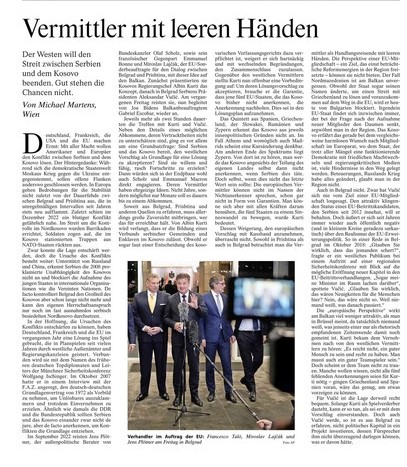Thread
The democratic world must win against fascist Russia. In these times it is obvious that open flanks elsewhere in Europe should be closed. This includes the conflict between Serbia and Kosovo. With the current methods, however, success is not very promising. (Guess what? A 🧵:
Last Friday, a high-ranking US and European delegation visited Prishtina and Belgrade. It consisted of the foreign policy advisors of Emmanuel Macron, Olaf Scholz, the Italian Prime Minister plus the EU and US special representatives for the region.
Backed by the US, Germany, France and the EU in September 2022 proposed to Serbia and Kosovo that they settle their conflict along the lines of the 1972 German-German basic treaty. Meaning: Accept the other side, without formal recognition. Agree to disagree. Move forward.
In this 2nd visit, the talks with Kosovo Prime Minister Kurti and Serbian President Vučić
lasted more than two hours each and revolved around one basic question: Are Serbia and Kosovo ready to accept the Western proposal as a basis for a solution?
lasted more than two hours each and revolved around one basic question: Are Serbia and Kosovo ready to accept the Western proposal as a basis for a solution?
It is said that Kosovo's Prime Minister Kurti set one condition: In order to accept the Western proposal for a solution, he needs a guarantee that the 5 EU states that have not yet recognized Kosovo will do so. Kurti allegedly demanded for this to be included in the proposal.
This is obviously a demand that neither the EU nor Germany or France can fulfill, as they cannot speak (let alone give guarantees) in the name of Spain, Romania, Greece, Slovakia and Cyprus. All of those countries have their domestic reasons not to recognize Kosovo.
It seems the West tries to frame Kurti as a stubborn egomaniac who does not grasp the potential of the Western offer. But when you look at the last 10 years of EU Balkan policy, the reluctance of Kurti (and of Serbian president Vučić) to trust Western promises is understandable.
In essence, he Western envoys come to Prishtina and Belgrade like salesmen with empty hands. Or better: Like salesmen who try to sell a product that is out of stock. No wonder their potential customers are suspicious.
The big promise of the West in the region since the 1990ies was membership in the European Union. But since 2013 not a single new member has been accepted, and the betrayal of North Macedonia has left a lasting scar on the Union´s reputation in the region.
(For those not closely following the region: Macedonia even changed its state name in order to make progress on the way to the EU. However, it was blocked by Bulgaria anyway. And someone is always blocking. The European promise has lost its appeal. It's no longer convincing.)
Kurti and Vučić of course know that. So why should they risk political capital? For a ticket to Neverland? Kosovo is not even getting crucial Western help in its bid to join the Council of Europe. Why should it expect better treatment on its way to the EU?
Some say Russia's war changed everything. ("Zeitenwende"). Let's wait and see. So far this is mostly rhetoric. One problem seems to be that Western negotiators overestimate the attractiveness of the "European perspective".
The European perspective (without quotation marks) was once very attractive – when it was still realistic. Tempi passati. Serbia's President Vučić has been very critical of this so called perspective for years. One must just listen to him.
Take his speech at the opening of the 2018 Belgrade security forum. “Do you really think”, he asked, “that if you are going to say ‘Now we are going to open 2 chapters, or 2 chapters, now even my ministers in the room are laughing (…) do you really think someone cares about it?”
“Do you really think it is going to be news for people here? No, it is not. And it is because nobody knows what will happen after that”, Mr. Vučić said in 2018. He has repeated this idea often ever since. And he has a point. The “European perspective” lost credibility.
Sources say that Mr. Vučić opened the Belgrade meeting on Friday with his usual drama show. (“You are killing me. I hate you. I wish I had never met you” etc). Some Westerners warn him that he cannot sit in two chairs much longer. Hm. Really? Can´t he? Not sure.
As long as the West identifies Kurti as the real problem (although the core problem is that the EU has nothing to offer), the situation for Vučić is easier. He can claim that Kurti is to blame for the lack of a solution, while he basically agrees with the Western proposal.
Of course, the fact that Kurti finds all kinds of lame excuses to not allow the Association of Serbian majority municipalities is not befitting a real leader. Petrit Selimi has said what needs to be said on this:
But even if Kurti should finally have the guts to do what is right and to respect the Constitutional Court of his country, this alone will not contribute to a lasting solution as long as there is no overarching European concept for Kosovo and Serbia. And there is none, currently.
